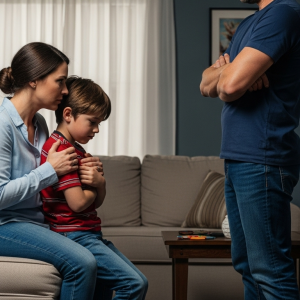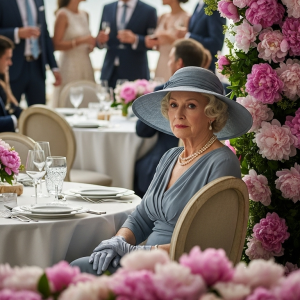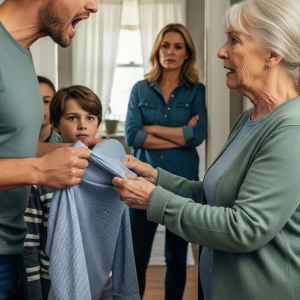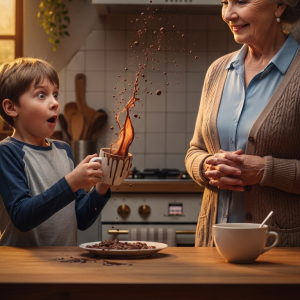My son scheduled a family dinner at the most exclusive restaurant in the city, but when I arrived, there was no seat for me. My daughter-in-law, Victoria, offered a venomous smile. “Perhaps,” she suggested, her voice dripping with contempt, “a cheaper place would be better suited for you.”
A laugh escaped me, rising from the depths of a soul wounded by decades of sacrifice. They all stared as if I’d lost my mind. Ignoring them, I walked to the owner, my trusted partner of fifteen years, Elias. His eyes lit up with recognition.
My sons didn’t know that this elegant restaurant, the stage for my humiliation, was mine. Every dish they ordered, every glass of fine wine they drank, funneled money directly into my bank account. I am Teresa, I am sixty-nine, and I have just seen the true faces of the children for whom I gave everything.
I was widowed at thirty with three small children. My little Elena died of pneumonia because I couldn’t afford a private hospital. On that day, I swore her brothers, Daniel and Mark, would never know such poverty. For forty years, I worked as a housekeeper, my hands cracking and my back stooping as I cleaned other people’s homes.
While other mothers went to the park, I scrubbed strangers’ bathrooms. While they took family vacations, I worked weekends to pay for school trips. I sent them both to private universities. I bought their first cars, paid the down payments for their condos, and financed their lavish weddings. I gave them the life I never had.
Daniel, my eldest, married Victoria, a cold woman who saw me as a threat from the start. Mark, my younger son, was always weaker, a follower. For the past fifteen years, I stopped depending on my housekeeper’s salary, but they never knew. I preferred they see me as a poor, dependent old woman. It’s the best way to see people’s true colors.
Last Tuesday, Victoria called, her voice syrupy sweet. “Teresa, darling, we’re having a family dinner to celebrate Daniel’s promotion. It’s at The Terrace. Saturday at eight.” Of course, I knew the place. I knew it better than she could possibly imagine.
I arrived on time, dressed in my best clothes, which to them were still just the tired garments of a housekeeper. At their table, five chairs were occupied, and none were free for me. “Excuse me,” I said, my voice steady. “I believe a chair is missing.”
Daniel looked up, his face a mask of annoyance and embarrassment. “Mom,” he said, his voice low, “we thought it might be better if you ate somewhere else. This place is quite… exclusive. We don’t want you to feel uncomfortable.”
Victoria nodded, her smile a weapon. “Exactly, Teresa. Something more appropriate for your situation.” The words were like slaps. Mark, the coward, simply looked away. It was then that I began to laugh, a sound that started soft and grew until the entire restaurant fell silent.
Ignoring their panicked faces, I walked to the host stand where Elias was waiting. “Excuse me,” I announced, my voice carrying across the silent room. “I would like the main table. The one in the center.” Elias bowed slightly. “Of course, Mrs. Teresa. Your usual table is ready.”
The silence that followed was deafening. I saw Daniel’s eyes widen in shock, Victoria turn ghost-white, and Mark drop his fork. They never bothered to ask, never imagined that Teresa, the housekeeper, had secrets that could shatter their fragile world of lies and appearances.
Fifteen years ago, while they were busy building their perfect lives with my money, I began investing my savings. Not in stocks, but in properties, in businesses, in places exactly like The Terrace—the exclusive restaurant where they had just told me I didn’t belong.
Daniel stumbled toward my table, his composure gone. “Mom,” he whispered, his voice trembling. “What is going on? How do they know you? Why are they treating you like… like…”
“Like I’m the owner?” I finished for him, a serene smile on my face. “Because I am, Daniel. I have been the majority partner of this restaurant for fifteen years. Every promotion, every anniversary you’ve celebrated here has been paid for in my establishment.”
His face collapsed. “That’s impossible. You clean houses.”
“Ah, my dear son,” I replied, savoring the moment. “And that is your first mistake. Assuming that because I cleaned houses, I was poor. Assuming that because I sacrificed for you, I was stupid.”
Victoria, staggering over in a daze, could only stammer, “But… where did you get the money?” Her voice, once so arrogant, was now small and frightened. “It’s simple, my dear. While you were spending the money I gave your husband, I was saving. While you were living a life of luxury you thought was your right, I was building a future you thought I didn’t have.”
“Three months ago,” I continued, my voice cold and clear, “I lost my cleaning job. I told you nothing because I wanted to see if you would care, if you would offer to help. Instead, you saw an opportunity. You saw my vulnerability as a chance to finally get rid of me.”
I turned to Daniel. “Remember our conversation last week, Daniel? You suggested a nursing home. You said it was for my own good. What you really meant was that you wanted me out of your life because I was no longer useful to you.”
Just then, Elias leaned in. “Mrs. Teresa, there are journalists at the entrance. Someone leaked that you are here.” A slow, wicked smile spread across my face. “Perfect,” I whispered. “Let them in.”
Victoria’s eyes filled with panic. “Teresa, please! Don’t make this public! Daniel could lose his job!”
“Lose his job for what, Victoria?” I countered, my voice rising. “For humiliating his own mother? For trying to kick her out of a restaurant she owns? For treating her like a beggar after she financed his entire life?” The first camera flash went off, illuminating their terrified faces. This was just the beginning.
The journalists swarmed our table like sharks sensing blood. “Mrs. Teresa,” a reporter shouted, “is it true your own sons just tried to throw you out of your own restaurant?”
My smile was wide and unforgiving. “That is correct. My sons, for whom I sacrificed forty years, told me to find a cheaper place, something more appropriate for my situation. I believe McDonald’s was the suggested alternative.” The cameras swung toward Daniel and Victoria, whose faces were a mixture of shame and terror.
“It was a misunderstanding!” Daniel blurted out.
“It was no misunderstanding,” I cut in, my voice ringing with authority. “It was a calculated humiliation. And just last week, these same sons came to my home to suggest I move into a nursing home because my apartment was too large for a retired housekeeper.”
The look of horror on Mark’s face was perfectly captured by the cameras. “Mom, please,” he begged. “They’ll think we’re monsters.”
“You are,” I replied without a flicker of hesitation. “You are monsters of my own creation, built from a lifetime of sacrifice without gratitude.” The story went viral. By the next morning, Daniel was suspended from his job at the bank. Victoria was ostracized from her social circle. My revenge had begun, and it was going to be swift and absolute.
Desperate, Daniel and Victoria posted a tearful video on social media, painting themselves as the victims of a manipulative mother. It backfired spectacularly. The public remembered the images of their cruelty, and the comments were brutal.
But I had an ace up my sleeve. For years, I had recorded our conversations, not out of malice, but to aid my failing memory. At sixty-nine, I launched my own YouTube channel. My first video, titled The Truth Behind the Crocodile Tears, featured audio of Daniel calling me a financial burden and Victoria mocking my clothes.
The most damning recording was of Daniel rummaging through my apartment, looking for bank statements to calculate the cost of my nursing home. “People her age often develop dementia,” his voice said in the recording. “It’s important for the family to control their resources.”
The public reaction was a tidal wave. #JusticeForTeresa became a global trend. My story had touched a universal nerve. Meanwhile, the consequences for my sons escalated. Daniel was fired. Victoria lost her job. Mark’s girlfriend left him. They had lost everything.
They begged for a meeting. I agreed to see them at The Terrace, at my table, on my terms. They arrived looking broken, their arrogance stripped away, replaced by raw desperation.
“You will listen to my conditions,” I began, my voice like ice. “First, a public apology, detailing every one of your actions. Second, you will pay back every cent I invested in your lives—two point eight million dollars. Third, you will work to pay it back, starting from the bottom, as cleaners and kitchen staff in my businesses.”
Victoria sobbed. “This is pure revenge.”
“No, my dear,” I replied. “This is justice. Revenge would have been leaving you on the street. I am giving you a chance to earn my forgiveness, but you will do it the hard way.” The conditions continued: they would live in small, working-class apartments, perform community service in nursing homes, and sign away any right to my inheritance. They had no choice but to accept. On Monday morning, their new life began.
The first few months were brutal. Daniel, once a bank executive, mopped floors. Victoria, once a socialite, washed dishes in the very restaurant where she had humiliated me. Mark, the indecisive follower, learned to repair pipes and paint walls. The physical labor was hard, but the social humiliation was harder.
I, in the meantime, moved into a mansion and established the Invisible Mothers foundation, using my story and newfound fame to help other elderly women facing abandonment and abuse. My story became a global symbol of maternal dignity.
After six months, I saw a genuine change in my children. The hard work had instilled a humility they never possessed. Their community service in nursing homes had opened their eyes to the cruelty they had almost inflicted upon me. They were transforming, not out of fear, but from a true understanding of their actions.
One year after the incident, we had a real family dinner, cooked by Victoria in the kitchen of The Terrace. The wounds were not completely healed, but it was a genuine start. They had earned back a place in my life, not as heirs, but as people.
Five years have passed. Daniel now manages two of my hotels, having worked his way up from the bottom. Victoria is the celebrated executive chef at The Terrace, her passion for cooking discovered while scrubbing pots. Mark runs a successful maintenance company, specializing in adapting homes for the elderly.
My foundation has expanded internationally, helping thousands. I have forgiven my sons, not because I have forgotten, but because they worked to earn it. They became people worthy of respect. At seventy-four, I have learned that it is never too late to demand the dignity you deserve, and that sometimes, the most painful lessons are the foundation for true, unconditional love.
Years passed, not in a blur, but as a series of distinct, cherished moments. The family I had forged from the ashes of betrayal was stronger than I could have imagined. We had our routines: Sunday lunches in my garden, birthday parties that were loud with the laughter of grandchildren, and quiet check-in calls just to say hello. The scars of the past remained, but they were no longer tender wounds; they were silvery lines that told a story of survival and rebirth.
Daniel had become a respected hotelier, known for his fair treatment of staff and his meticulous attention to detail. Victoria’s restaurant, The Terrace, had earned a Michelin star, a testament to the passion she had discovered in the flames of the kitchen. Mark’s company was now the city’s leading firm for elderly home modifications, a business born from a place of deep regret and a desire to do good. They were happy. More importantly, they were decent.
I, at seventy-seven, was content. My foundation, Invisible Mothers, had offices in twelve countries, and my books had been translated into thirty languages. But my greatest achievement was the peace that had settled in my heart. The anger was long gone, replaced by a quiet pride in the people my sons had become. I thought the greatest tests were behind us. I was wron
It happened on a Tuesday. I was in my garden, pruning my roses, when a sudden, sharp pain shot through my chest, and the world dissolved into a dizzying vortex of gray. I remember the scent of the soil as I fell, and then, only silence. I awoke in a hospital room, the sterile white ceiling a stark contrast to the blue sky I had last seen. The diagnosis was a mild stroke. My body was weakened, my speech slightly slurred, but my mind was sharp, and in that clarity, a cold fear gripped me—a fear I hadn’t felt in years.
I was vulnerable. The powerful matriarch, the secret millionaire, the woman who had brought her children to their knees, was now frail in a hospital bed. For a terrifying moment, the ghosts of the past whispered in my ear. I remembered Daniel’s words about nursing homes, Victoria’s contempt, Mark’s silent cowardice. Had their transformation been real, or was it a long-term performance? Now, with nothing to offer but need, I would finally know the truth.
My lawyer, Ezekiel, was the first person I saw. He told me he had called my sons. My heart hammered against my ribs as I waited. The minutes stretched into an eternity. Then, the door burst open. It was not one of them. It was all three. Their faces were pale, etched with a raw, undisguised terror that immediately silenced my own fears.
What followed was not a performance. It was a testament. They moved with a seamless, unspoken coordination born of pure love and determination. Daniel, the former executive, took charge. But this was not the cold efficiency of a banker; it was the fierce organization of a son protecting his mother. He spoke with doctors, arranged for the best specialists, and handled a mountain of paperwork, never leaving my side for more than an hour.
Victoria arrived with three large bags. She had packed my softest nightgowns, my favorite books, and had cooked enough nourishing, pureed food to feed a small army. She brushed my hair, held a cup of water to my lips, and when I struggled to speak, she simply held my hand, her presence a warm, comforting anchor in the sterile room. She didn’t see a burden; she saw her mother.
Mark, my gentle Mark, was the quiet pillar. He arrived with blueprints of my house. “I’m going to make some changes, Mom,” he said, his voice thick with emotion. “We’re installing a chairlift for the stairs and safety rails in the bathroom. When you come home, you won’t have to worry about a single thing.” He wasn’t planning my exit to a nursing home; he was ensuring my home remained my sanctuary.
They took shifts, refusing the hospital’s offer of private nurses. They slept in uncomfortable chairs, their nights broken by the beeping of monitors. I would wake in the dead of night to see Daniel reading by a dim light, or to find Victoria quietly weeping in the corner, or to feel Mark adjusting my blanket. They were not just caring for me; they were atoning.
A week later, I was back in my own home, a place made even safer and more comfortable by Mark’s loving hands. Victoria had moved into one of the guest rooms, and Daniel had set up a temporary office in my study. They were a constant, reassuring presence.
One afternoon, Daniel was sitting by my bed, reading a financial report aloud to keep me company. I watched him, the son who had once seen me as a financial burden, now patiently explaining market trends to his recovering mother.
“Daniel,” I said, my voice still weak but clearer than before. He put the papers down immediately. “I was scared,” I admitted, the confession costing me a great deal of pride. “In the hospital, for a moment… I was scared that you would see this as an opportunity. To finally be rid of the old woman.”
The color drained from his face. He knelt by my bed and took my hand, his grip gentle but firm. His eyes, clear and filled with a pain that was entirely for me, met mine.
“Mom,” he said, his voice cracking. “The fact that you could even think that, even for a second, is the greatest shame of my life. It is the scar I will carry forever.” He took a deep breath. “Let me be clear. The woman in this bed is not a burden. She is the foundation of this entire family. We are not those people anymore. Caring for you is not an obligation. It is the highest privilege of our lives.”
In that moment, the last of the old wounds finally healed. The fear that had been a silent poison in my heart for years was gone, replaced by a profound and unshakeable certainty. I had not just taught my children a lesson; I had guided them back to their own humanity.
My recovery was slow, but I was never alone. Victoria’s daughter, Hope, would sit with me, drawing pictures. Mark’s twins would tell me stories from school. My children and their partners surrounded me with a fortress of love. As I regained my strength, I realized that this experience, this brush with my own mortality, was the final, unexpected gift.
It had proven that the change in my family was not superficial; it was cellular. It was real. I had once used my wealth as a weapon to demand respect. Now, in my moment of weakness, I had been given true love, freely and without condition. That, I knew, was the only inheritance that ever truly mattered.




